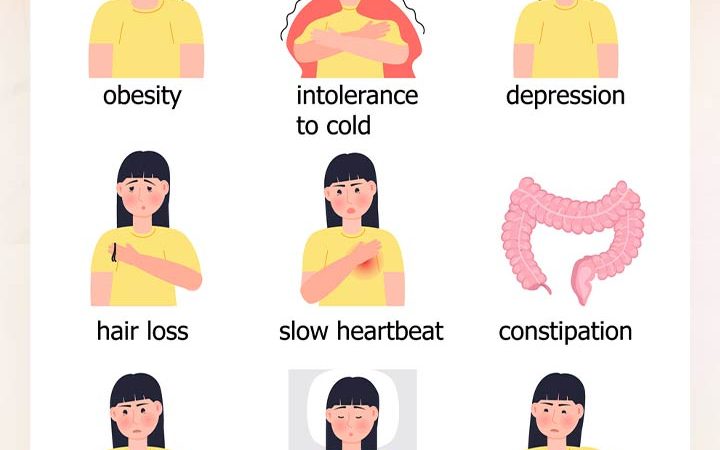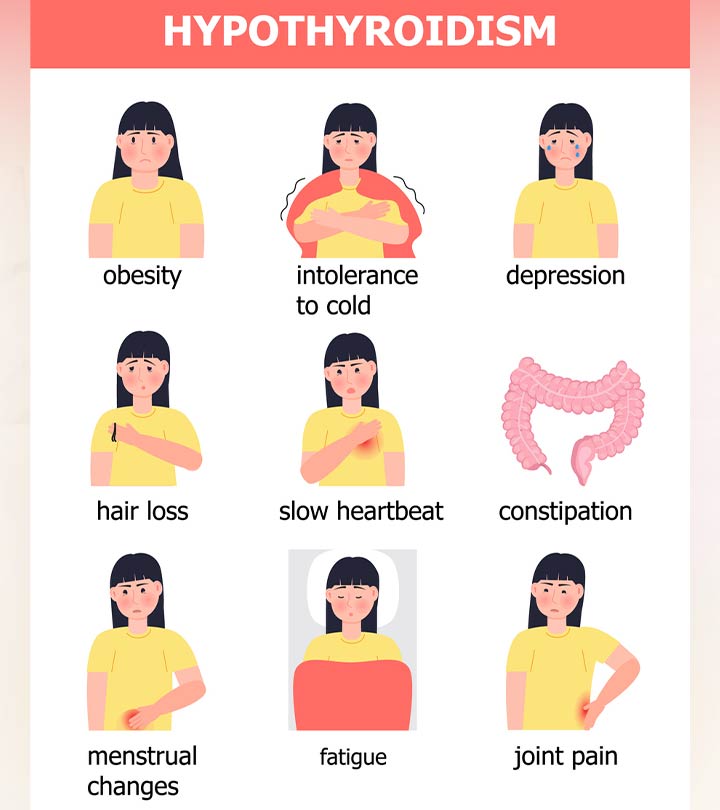The thyroid gland is a butterfly-shaped endocrine gland located below the larynx (voice box) in the front of the neck. It produces thyroid hormones, including thyroxine (T4) and triiodothyronine (T3), which are secreted into the bloodstream, and the thyroid-stimulating hormone (TSH), which is produced in the brain.
These hormones regulate your child’s metabolism and energy utilization and ensure the brain, heart, kidney, and other organs function properly (1). Therefore, thyroid dysfunction or disorders can have profound detrimental effects (2) (3).
This post discusses the types, causes, symptoms, diagnosis, and treatment of hypothyroidism in children.
Hypothyroidism In Children
The main thyroid disorders are hyperthyroidism or excessive thyroid hormone production (overactive thyroid gland) and hypothyroidism or insufficient hormone production (underactive gland). Adults are more likely to have hypothyroidism, but it is the most common thyroid condition in children and teenagers (4).
The clinical presentation of hypothyroidism may vary among different children, and they may have different symptoms than adults. Many of these clinical manifestations are non-specific and may be overlooked as routine aspects of daily life (5) (6).
Video Link:
Symptoms Of Hypothyroidism In Children
Hypothyroidism may go unnoticed since its symptoms develop slowly and resemble those of other diseases or medical conditions (5) (6).
However, according to the American Diabetes Association and the Pediatric Endocrine Society, children may exhibit the following hypothyroidism symptoms (2):
- Tiredness and decreased energy
- Swollen or puffy appearance
- Weight gain without increased appetite
- Slower growth rate
- Sore muscles
- Constipation
- Dry skin
- Brittle and dry hair
- Depression
Younger children may have delayed tooth development and short limbs (owing to a slower growth rate) (7). Meanwhile, older children may have delayed pubertal development and irregular or heavy menstrual periods. Children may also have increased sensitivity to cold (8).
Types Of Hypothyroidism In Children
Hypothyroidism is mainly of three types (9) (10)
- Primary hypothyroidism occurs when the thyroid gland cannot produce enough thyroid hormone on its own.
- Secondary (central) hypothyroidism occurs when the thyroid gland is normal, but the pituitary gland in the brain, which regulates growth and sexual development, functions abnormally.
- Tertiary hypothyroidismoccurs due to a dysfunctional hypothalamus in the brain, which maintains the homeostasis of the body.
Hypothyroidism in children can be further subdivided as
- Hypothyroidism present at birth, which includes:
- Congenital hypothyroidism (CH): It is caused by fetal thyroid gland underdevelopment or dysfunction. It is a common illness that affects one in 4,000 to 5,000 babies born in the US. Due to its high prevalence, CH testing is included in newborn screening programs in all the US states (6) (11).
- Transient hypothyroidism: It is caused by exposure to thyroid medication or the mother’s antibodies because of maternal hypothyroidism. It normally resolves on its own without requiring long-term therapy (1).
-
- Acquired hypothyroidism develops after birth, usually during late childhood or adolescence. Depending on the underlying cause, it can be further divided into autoimmune hypothyroidism and iatrogenic hypothyroidism (6).
-
- Subclinical hypothyroidism is hypothyroidism discovered at an early stage when the TSH is slightly higher than usual but the T3 and T4 levels are normal. Subclinical hypothyroidism is characterized by the absence of symptoms and major health consequences. It could be identified if you experience goiter or weight gain or have a significant family history of thyroid disease. It often resolves without medication (8)
Risks Factors For Hypothyroidism In Children
The following are some risk factors that may predispose your child to develop hypothyroidism (4) (12):
-
- History of thyroid problems, such as goiter (caused by insufficient iodine intake)
- An autoimmune disorder, such as type 1 diabetes or celiac disease
- History of surgery to correct a thyroid problem
- History of radiation treatment to the thyroid gland, head, neck, or chest
- Family history of thyroid disorders
- A chromosomal disorder such as Williams syndrome, Down syndrome, or Turner syndrome
- Thyroid gland injury
- Premature birth (7)
Causes Of Hypothyroidism In Children
The cause of hypothyroidism decides the type of hypothyroidism your child may be diagnosed with. Some causes of hypothyroidism in children include (6) (8):
- Autoimmune disorders, such as chronic lymphocytic thyroiditis (CLT) or Hashimoto’s thyroiditis, may cause autoimmune hypothyroidism, where the immune system attacks the thyroid gland, causing impaired thyroid function. CLT affects girls and teenagers more than boys and pre-adolescents.
- Surgical removal or medical ablation of your child’s thyroid gland (or part of it) can cause iatrogenic hypothyroidism as their body can no longer produce thyroid hormones.
- Thyroiditis (inflammation of the thyroid gland) due to a viral infection can leak stored thyroid hormones, causing hyperthyroidism for a short time before the thyroid gland becomes underactive (hypothyroidism).
- Radiation treatment to the neck or head for conditions such as Grave’s disease can destroy or injure the thyroid gland, causing thyroid hormone dysfunction.
- Medicines such as Amiodarone, Lithium, Interferon-alpha, and Interleukin-2 can decrease thyroid hormone production
- Damage to the pituitary gland may lead to insufficient TSH production, subsequently causing hypothyroidism.
Diagnosis Of Hypothyroidism In Children
To diagnose hypothyroidism in children, your doctor may require (6) (13)
- Your child’s symptoms
- Your child’s medical and family history
- A physical examination
- Bloods tests or thyroid function tests to check the TSH and T4 levels in the blood
- Thyroid imaging tests, such as a thyroid scan, ultrasound, or radioactive iodine uptake test
Treatment For Hypothyroidism In Children
The purpose of hypothyroidism treatment is to restore the hormone levels to normal and support your child’s normal growth and development, depending on their age, overall health, and other factors. Your child may be referred to a pediatric endocrinologist, who treats children with hormonal problems (4).
The treatment mainly includes taking thyroid hormone replacement pills, such as Levothyroxine (T4 only) pills once daily, to boost the level of thyroid hormones in the body, also known as replacement therapy. Levothyroxine may be taken in the morning before food.
Your child may need to take these synthetic thyroid hormone pills lifelong (such as for iatrogenic hypothyroidism) or until their growth and puberty are complete. During the treatment, your healthcare provider will regularly check your child’s blood to see if the treatment is working, and their growth and development will be tracked over time (7).
Additionally, supplements such as calcium, iron, and vitamins are contraindicated with Levothyroxine and should be avoided during thyroid replacement therapy (8).
Complications Of Hypothyroidism In Children
Although hypothyroidism can be effectively managed with medication, if left undiagnosed or untreated, it can lead to various complications in children, including (5) (7) (10)
- Low levels of red blood cells (RBCs) (anemia)
- Low body temperature
- Heart failure
- Nervous system issues, such as lower IQ and impaired motor skills
- High cholesterol
- Stunted physical growth
- Mental retardation
- Myxedema coma, where the body’s activities slow down to a point where it becomes life-threatening (rare)
When the thyroid gland produces insufficient thyroid hormones (underactive), it leads to hypothyroidism, the most common endocrine disorder in children. A child with hypothyroidism may exhibit poor growth rate, fatigue, dry skin and hair, and stunted growth. However, these symptoms are common for other diseases as well. Consult your pediatrician if your child exhibits and of these symptoms or has a family history of thyroid disorders.
References:
MomJunction’s articles are written after analyzing the research works of expert authors and institutions. Our references consist of resources established by authorities in their respective fields. You can learn more about the authenticity of the information we present in our editorial policy.
The following two tabs change content below.




































